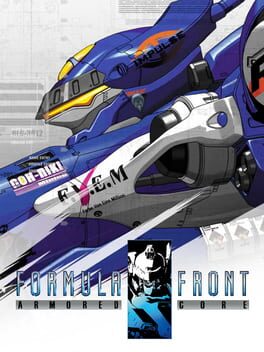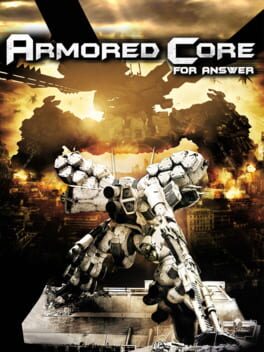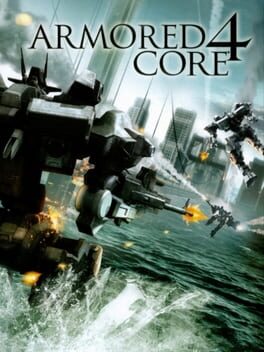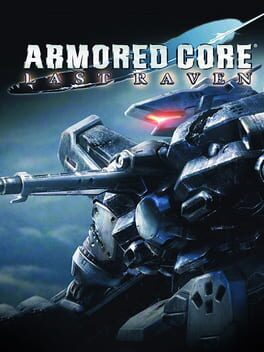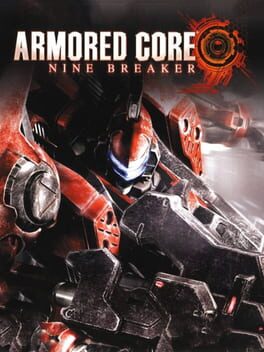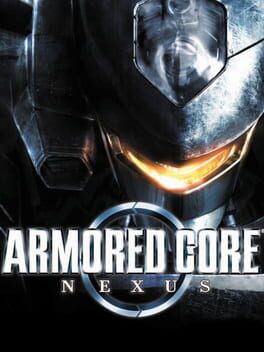Unlike most other, action-oriented Armored Core titles, this installment is a strategy game. The player has no direct control of the mech in the action but can customize the mech as always, implementing additionally an AI that will fight on its own. The role of the player is to customize the mech and train the AI on training arenas. The two versions of the game allow for data transfer via USB, letting players exchange mech data between the PSP and PS2.
Also in series
Reviews View More
Really enjoy popping on the PSP just to have a fight or two here and there, but I'm still a little conflicted about Formula Front as a whole. Being solely based around the Arena and AC fights gives it a higher baseline of quality, but a game like Silent Line has both great missions and an enjoyable Arena in relatively equal measure, which sort of puts a cap on how much you might get out of this. At the same time, it sticks to that structure very well, opting to completely do away with a financial economy for the sake of keeping customization as the primary and stress-free focus. The saying about Nine Breaker is that it trains you on the fundamental mechanics solely in preparation for you to be able to handle Last Raven, and I'd joke that Formula Front fills that same kind of niche in regards to AC building. By both only pitting you against ACs and also removing any long-term decision-making or risks, you get to engage with this system while also testing it in more practical scenarios than target tests and obstacle courses. I think restricting any given parts to only one AC at a time is ultimately in good service of that idea, as it helps keep players from being repetitive in their setups and exposes a wider pool of viable parts, namely in regards to boosters, radiators, and the associated overhauled heat management that returns from Nexus. That said, I find this idea is better expressed in the PS2 version, where your entire team of ACs goes against another in a relay-style endurance match. Since every individual AC is more important with this approach, you're pushed into seeing the balance more clearly, rather than with the PSP's adherence to 1v1s. Thankfully, enemy variety is still up to par, especially combined with the International edition's post-game (but barring the frequent spam of Napalm Rockets), and the arena selection is also great, with a good blend of open and constrained spaces, complicated geometry, the occasional radar interference, and even a returning locale from Silent Line...easy bonus points for me there.
As for the A.I. building, I can certainly speak to the novelty and joy of making something like a flamethrower and parry blade build work successfully, but even with traditional ACs, it's still really just that: novel. Credit where credit is due, it's presented in a pretty digestible way with plenty of optional tutorials, but it's not fundamentally integral to the scenarios or anything, and once you make a good A.I. setup for any given build, you can kinda just stick with it without much need to change it. The systems on the whole are also a little unbalanced. Particularly, in the A.I. tuning screen, in which you assign a pool of points into categories you want your A.I. to be efficient in, the "Offense" and "Defense" categories are basically dump stats that don't affect your AC's approach in any distinguishable way, giving you a lot of free points to put towards more fundamental stats like terrain location and energy efficiency. Even as one of my builds actively uses the head piece that has the lowest amount of these points, it's still trivial to max out all of the important stats first and not have too much of a cut in performance compared to the average AC. Still, I appreciate the theoretical ways this system interacts with your AC parts, since good radars could let you offset points in Search Control, generators for Energy Control, and so on. A lower average total of points might have been interesting to see here.
Similarly, while the Operations mechanic allows you to guide your AC towards more specific behaviors, it has some quirks. Tying their activation to time brackets (Chip 1 is in use from 0s-30s, Chip 2 from 30s-60s, etc.) is pretty rigid, and since AC fights can be so dynamic, it can be difficult to set them up in an optimal way, especially when fights also rarely go past the two minute mark. My suggestion would be to allow for the activation of any chip mid-battle, on or off, but keep them at only 30 total seconds of use across the match. I'd say that's just enough manual control while still leaving the heavy lifting out of your hands. Additionally, some of the chip distinctions might be too specific: chips that use Back parts in particular are very clear about whether or not they use only the part on your AC's right side, or the left, which would be fine if each type had a variations for both sides, but the lack of consistency in that aspect is…not fatally bad, but still a strange omission. Ideally you're setting up your chipset around your builds, not vice-versa.
The system where you adjust the basic general behaviors of your ACs is probably the best facet of the A.I. mechanics, as it's easy to understand the decisions you're making in any given category. What kind of range and attack variety do you want an AC to stick to given its loadout? How much mobility do you want and what types of movement are most important? Should it be aggressive or focused on survivability? Not only are these parameters simple, but since there's no variable resource tied to adjusting them, it's very purely balanced among every possible build, especially when the associated strengths and weaknesses are so universal.
All things considered, the building is certainly a lot more involved here than the usual Armored Core setup, so the big question is if the end result is A.I. that functions competently, and I'd say things are actually pretty impressive in that aspect…if anything, it bunny-hops well. The A.I. does its job just fine most of the time, but there's also rare hiccups where it can get put in an awkward standstill, usually when backed into a corner, and not know what to do, which can be frustrating to see. Thankfully, if you don't want to bother with any of this, you can always opt to play with manual controls, which is why I can't dock it too many points (at least with the context of re-releases). If you're a true one who knows tank controls are king, the only concession on PSP is that vertical aiming is automated, but it actually works pretty well. I only ever ran into problems when I was intentionally toying with the enemy A.I, in general play it's about as accurate as can be...I mean, if you're up against a close-range hopping trickster, you'd likely be lagging with your aim about as much as the game does here.
Still, once I finally got around to things, I enjoyed my time messing with the A.I.. There's something nice about being in complete control of AC building while also letting the game handle all of the dexterous movement for you. If the concept speaks to you, I'll once again point to the PS2 version, where this is the only way to "control" ACs and it's all up to your A.I. skills to come out on top. If you want the hardcore Formula Front experience, that might be the way to go, especially since it also offers a bit more to the lore and narrative of this specific universe (at least, if you know Japanese).
Even on PSP, this aspect is still a unique part of FF's cutesy identity. The experimental mechanics stand out from the rest of the series, sure, but I feel like it's primarily a black sheep because of how it re-contextualizes the traditional Armored Core presentation into something more light-hearted. The player premise of a struggling mercenary tossed around by corporate powers is morphed into that of being a professional AC and AI builder, hired by an eager new sports team trying to make a name for themselves amongst pros backed by big-name sponsors. While light on lines, the mostly stoic personal operators from before have been swapped out for an excitable match commentator, always seeming on the edge of his seat and complete with his own cheesy "Ready? Go!"...well, with Japanese audio, at least. Getting mail used to be more cut-and-dry, but now you're reading about responses to low-tier upsets (usually by your hand), casual interviews with top team Architects on their perceived trajectories of the future of the titular Formula Front sports league, scoops on petty sponsorship drama, and, my favorite, the music concert of a team so popular they fully book the audience seating. Music's more upbeat on the whole with a lot more tunes in major keys (even if I don't find much of it that memorable), and even color schemes have taken a turn for the lighter. Menus are predominantly white and blue, and there's a lot more opponents unafraid of almost obnoxiously vibrant color palettes…gotta give shoutouts to the chef who painted his AC's head to look like a tomato. It's all very feel-good, and works in tandem with the aforementioned lack of mechanical tension to create something more appropriate for an on-and-off system like the PSP. Don't stress too much, come in, have a good time, and even when a fight's giving you trouble, keep at it and you'll be just fine.
As for the A.I. building, I can certainly speak to the novelty and joy of making something like a flamethrower and parry blade build work successfully, but even with traditional ACs, it's still really just that: novel. Credit where credit is due, it's presented in a pretty digestible way with plenty of optional tutorials, but it's not fundamentally integral to the scenarios or anything, and once you make a good A.I. setup for any given build, you can kinda just stick with it without much need to change it. The systems on the whole are also a little unbalanced. Particularly, in the A.I. tuning screen, in which you assign a pool of points into categories you want your A.I. to be efficient in, the "Offense" and "Defense" categories are basically dump stats that don't affect your AC's approach in any distinguishable way, giving you a lot of free points to put towards more fundamental stats like terrain location and energy efficiency. Even as one of my builds actively uses the head piece that has the lowest amount of these points, it's still trivial to max out all of the important stats first and not have too much of a cut in performance compared to the average AC. Still, I appreciate the theoretical ways this system interacts with your AC parts, since good radars could let you offset points in Search Control, generators for Energy Control, and so on. A lower average total of points might have been interesting to see here.
Similarly, while the Operations mechanic allows you to guide your AC towards more specific behaviors, it has some quirks. Tying their activation to time brackets (Chip 1 is in use from 0s-30s, Chip 2 from 30s-60s, etc.) is pretty rigid, and since AC fights can be so dynamic, it can be difficult to set them up in an optimal way, especially when fights also rarely go past the two minute mark. My suggestion would be to allow for the activation of any chip mid-battle, on or off, but keep them at only 30 total seconds of use across the match. I'd say that's just enough manual control while still leaving the heavy lifting out of your hands. Additionally, some of the chip distinctions might be too specific: chips that use Back parts in particular are very clear about whether or not they use only the part on your AC's right side, or the left, which would be fine if each type had a variations for both sides, but the lack of consistency in that aspect is…not fatally bad, but still a strange omission. Ideally you're setting up your chipset around your builds, not vice-versa.
The system where you adjust the basic general behaviors of your ACs is probably the best facet of the A.I. mechanics, as it's easy to understand the decisions you're making in any given category. What kind of range and attack variety do you want an AC to stick to given its loadout? How much mobility do you want and what types of movement are most important? Should it be aggressive or focused on survivability? Not only are these parameters simple, but since there's no variable resource tied to adjusting them, it's very purely balanced among every possible build, especially when the associated strengths and weaknesses are so universal.
All things considered, the building is certainly a lot more involved here than the usual Armored Core setup, so the big question is if the end result is A.I. that functions competently, and I'd say things are actually pretty impressive in that aspect…if anything, it bunny-hops well. The A.I. does its job just fine most of the time, but there's also rare hiccups where it can get put in an awkward standstill, usually when backed into a corner, and not know what to do, which can be frustrating to see. Thankfully, if you don't want to bother with any of this, you can always opt to play with manual controls, which is why I can't dock it too many points (at least with the context of re-releases). If you're a true one who knows tank controls are king, the only concession on PSP is that vertical aiming is automated, but it actually works pretty well. I only ever ran into problems when I was intentionally toying with the enemy A.I, in general play it's about as accurate as can be...I mean, if you're up against a close-range hopping trickster, you'd likely be lagging with your aim about as much as the game does here.
Still, once I finally got around to things, I enjoyed my time messing with the A.I.. There's something nice about being in complete control of AC building while also letting the game handle all of the dexterous movement for you. If the concept speaks to you, I'll once again point to the PS2 version, where this is the only way to "control" ACs and it's all up to your A.I. skills to come out on top. If you want the hardcore Formula Front experience, that might be the way to go, especially since it also offers a bit more to the lore and narrative of this specific universe (at least, if you know Japanese).
Even on PSP, this aspect is still a unique part of FF's cutesy identity. The experimental mechanics stand out from the rest of the series, sure, but I feel like it's primarily a black sheep because of how it re-contextualizes the traditional Armored Core presentation into something more light-hearted. The player premise of a struggling mercenary tossed around by corporate powers is morphed into that of being a professional AC and AI builder, hired by an eager new sports team trying to make a name for themselves amongst pros backed by big-name sponsors. While light on lines, the mostly stoic personal operators from before have been swapped out for an excitable match commentator, always seeming on the edge of his seat and complete with his own cheesy "Ready? Go!"...well, with Japanese audio, at least. Getting mail used to be more cut-and-dry, but now you're reading about responses to low-tier upsets (usually by your hand), casual interviews with top team Architects on their perceived trajectories of the future of the titular Formula Front sports league, scoops on petty sponsorship drama, and, my favorite, the music concert of a team so popular they fully book the audience seating. Music's more upbeat on the whole with a lot more tunes in major keys (even if I don't find much of it that memorable), and even color schemes have taken a turn for the lighter. Menus are predominantly white and blue, and there's a lot more opponents unafraid of almost obnoxiously vibrant color palettes…gotta give shoutouts to the chef who painted his AC's head to look like a tomato. It's all very feel-good, and works in tandem with the aforementioned lack of mechanical tension to create something more appropriate for an on-and-off system like the PSP. Don't stress too much, come in, have a good time, and even when a fight's giving you trouble, keep at it and you'll be just fine.
yeah ok this game exists
i guess the concept of tuning an AI on top of your AC is kinda cool but like you can just manually pilot the AC which feels like it's stronger 99% of the time
the controls are not great cause the PSP has less buttons, and having everything in your garage from the get go kinda sucks, there's no sense of progression at all due to that, i basically made a big tank with big energy weapons and went through the whole game with it.
Some fights can be a pain in the butt depending on your build but that's like in every AC arena fight. None of the fights really felt unique enough for me to remember them tho, at least for once the final boss isn't nine balls ig
i guess the concept of tuning an AI on top of your AC is kinda cool but like you can just manually pilot the AC which feels like it's stronger 99% of the time
the controls are not great cause the PSP has less buttons, and having everything in your garage from the get go kinda sucks, there's no sense of progression at all due to that, i basically made a big tank with big energy weapons and went through the whole game with it.
Some fights can be a pain in the butt depending on your build but that's like in every AC arena fight. None of the fights really felt unique enough for me to remember them tho, at least for once the final boss isn't nine balls ig
